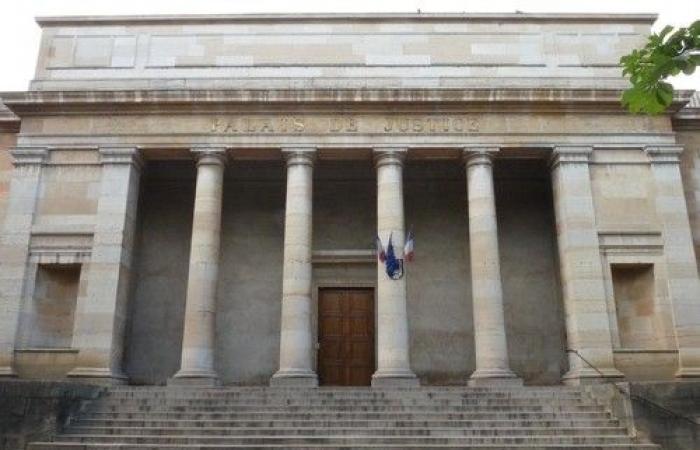The case is literally and figuratively inflamed. At the helm, a man born in 1978 who set up his own local business for an activity useful to the community. However, he is indeed the author of the acts committed in June 2023. He can only benefit from this CRPC* procedure on the condition that he absolutely admits everything of which he is accused, namely of having committed thefts to the detriment of his ex-father-in-law between May 18 and June 27, 2023, and of having set fire to the house of his ex-partner on June 27, in Varennes-le-Grand.
The CRPC: a simplified procedure, without contradictory debate
He set the fire, it is extremely serious and the damage is significant, but no contradictory debate in the CRPC. The defendant met the public prosecutor, assisted by his lawyer. The prosecutor offered him the sentence of 4 months in prison with home detention under electronic surveillance. Naturally the defendant accepted (with a criminal record and such facts, we can say that this sentence was unexpected, editor's note). Then he came to the courtroom. A judge is responsible for approving, or not, this sentence.
A referral to a criminal court composed of 3 judges “given the seriousness of the facts”?
But the question arises immediately because the victims are there. The woman hired a lawyer, her father represents himself “on his own,” he says, but they have big problems. The president therefore asks them if they would not prefer a referral to the “collegiate” criminal court (3 judges) given the seriousness of the facts.
The woman seems to want it, her father doesn't want it, he wants to “get it over with”, because he is “tired of it all”. Except that at the very end of the hearing he will talk about the “complaints filed” since he (the accused) “does not stop”. In these conditions, breathing peacefully is not yet on the agenda and he could have wished for a postponement so that a real debate takes place, so that the prosecutor can also listen to what they have to say.
The substance of the case is outlined by contrast in what the victims say
The one who does well is the defendant, who remains fixed on the stand, his eyes fixed on the judge, while behind his back, the victims express themselves.
The substance of the case is not addressed, CRPC obliges, so the substance is outlined by contrast in what the victims say. The president lets them express themselves while gradually explaining to them how the die has already been cast (sentence proposed and accepted – nothing the victims say will change anything, unless they refuse to approve the sentence).
“In total I recovered 11,950 euros out of the 15,000 he stole from me”
The father did some damage to the defendant's van while going to get “the money he took from me”. “In total I recovered 11,950 euros out of the 15,000 he stole from me.” “The expert told my daughter: 10 more minutes, and there was no more house. » The defendant and his daughter had a child. “There was an envelope for the birth of my grandson, there was 1,330 euros. I asked him, he said I don't know where she is. He never remembers anything, eh? He stole his son's money. »
“He was crying saying that he hadn't set the fire: he was crying but he was lying! »
The girl, mother of the child, in fact, is also having a hard time: “The only time I saw him cry, the only time, we were in confrontation. He was crying saying that he hadn't set the fire: he was crying but he was lying! » We then learn that the defendant refused to meet “an expert” (given the nature of the facts, we assume that it is an expert psychiatrist but the president does not specify this). “I want peace,” the woman continues. I got my dog back, I would have liked to get my phone back… Mister needs to stop looking for trouble. »
The defendant has the floor but doesn't want to say anything
“So we leave it there” concludes the judge. The defendant speaks but does not want to say anything. Suddenly it is his lawyer who will slip: “Monsieur regrets having committed the acts.” Then Maître Maréchal examines the civil parties' requests for compensation. We skip over the details but the father-in-law is agitated because many of his personal effects, stored at his daughter's house, have burned and all his papers (invoices, etc.) with…
He communicates photos to the president. It puts an end to the defendant's disputes (through his lawyer) on the amounts of the victims' demands. It must be said that everyone was getting agitated and talking indiscriminately: “enough!” The principle of justice is that everyone listens to each other. And then, I read the criminal procedure and what's more, the gentleman admitted all the facts. »
“It's not crazy, considering what was destroyed. It’s up to you to pay…”
The judge therefore approved the sentence of 4 months in prison, then ruled on the requests for damages. It's going to cost the defendant a lot, but the judge tells him: “It's not crazy, considering what was destroyed. It's up to you to pay, if you want things to calm down… For the rest you will be summoned to a sentencing judge who will set the terms of your detention (under bracelet). »
The ex-father-in-law intervenes without being invited. He said to the president: “You talk about appeasement, but there is none because he continues (“that’s enough!” thunders the defendant’s lawyer). The complaints are filed, because we know who he is, eh. »
A rather painful end to the hearing, all the fires are not out.
FSA
*CRPC: appearance on prior admission of guilt






